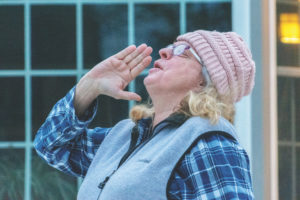A virtual festival of conversations with film professionals on “The Collaborative Art of Filmmaking” is being presented by the Film Society of Provincetown online. The film society’s former CEO, Christine Kunewa Walker, will moderate the event, and featured guests are colleagues on films she has produced, including American Splendor, Howl, Factotum, and Life During Wartime. Passes to the event are $75 at provincetownfilm.org, benefitting the film society. Screenings of the films referenced are not included in the pass but can be streamed online. This event can be watched anytime between October 8th and October 11th.
howl
NOISEMAKERS
Joining the Wolf Pack
A journalist learns how to howl
WELLFLEET — When I first heard about the howling in Wellfleet, I was skeptical. I had seen a post on Facebook’s Wellfleet Community Space asking people to “share the love” and howl at the moon at 7:30 p.m. Though I’d heard about people around the world making communal noise in support of essential workers — singing, clapping, banging pots and pans — to me, howling sounded a bit New Age. Still, my interest was piqued, so I reached out to Jean Sagara, who had made the post.

Sagara explained to me via email that she’d learned about howling from Andy Lisle, a fellow Wellfleetian. The first time she tried it, she said, “I was part of a pretty good howling session. It was a blast! I felt that we were all there to connect, uplift, and share a voice that said, ‘We’ll get through this together.’ ”
Most nights, Sagara said, “I stop everything I’m doing — dinner, phone conversations, my book, a movie, playing my violin or cello — to go out and howl. Sometimes I have chills, sometimes I laugh out loud, and a time or two my eyes teared up.”
I was astonished — could howling really be such a mystical experience? I contacted Andy Lisle. “The idea of howling came from a text I received from a friend of mine, Van, who lives in California,” Lisle said via email. “I’d asked him how he was doing, and in return, I received a video of him howling into the night sky. It was blurry and the sound was garbled, so at first, I thought coyotes were answering his calls. But then it clicked — those were people howling! I said aloud to myself, ‘We need to do that here.’ ”
Lisle explained that the appointed time, 7:30 p.m., was arbitrary: back in March, when he started howling, that was when the sun set. He did not know how many people howled in Wellfleet, and to him, the number was unimportant. “We all need some sort of release,” Lisle said. “But we also need to know that we are not alone.” That’s why wolves and coyotes do it.
I was still dubious, so last week, I drove from my home in Truro to Main Street in Wellfleet. At 7:30 on the dot, I turned off my engine and listened hard. At first, nothing. After what felt like an eternity, I heard some faint whimpers. Then something amazing happened. Right in front of me, a man stepped onto his yard, hesitated a moment, then howled with absolute abandon. I wasn’t planning on participating, but, as if compelled by an outside force, I found myself howling along. It was fun — and oddly profound.
Howling is primal in essence — a release of sadness, worry, and frustration. It’s another way to connect with our neighbors at a time when we are isolated by choice. As someone who studies music, I am sensitive to the emotional and social capabilities of sound. I wouldn’t say that howling is music, but it is expressive. I am reminded of Allen Ginsberg’s poem “Howl,” a cry of protest against injustice and repression.
If you are still doubtful about howling, I understand. But if you’re convinced of its merits, Lisle offers this advice for newbies: “Go easy the first couple of nights. Otherwise, you may get hoarse the next day. Also, be sure to get in a howling stance! Mostly, enjoy yourself. Howling is about connecting during a time of crisis that’s beyond what we have ever known.”
